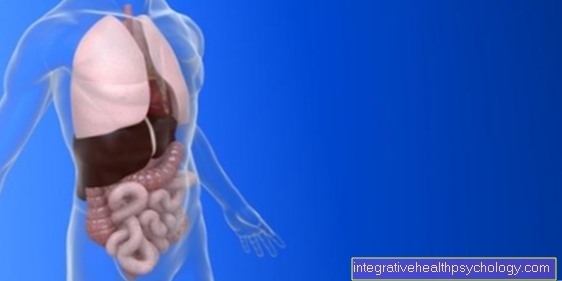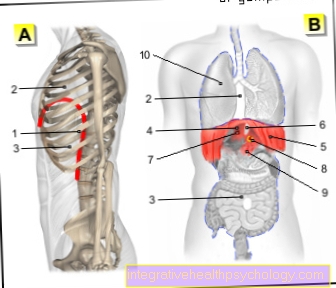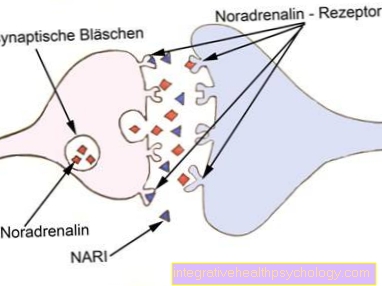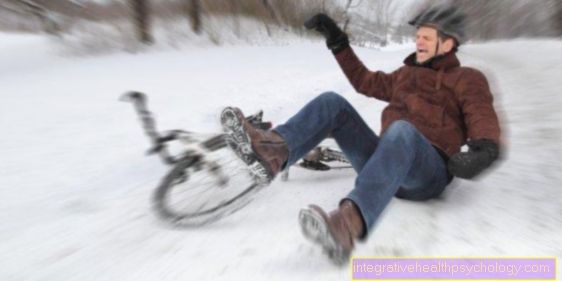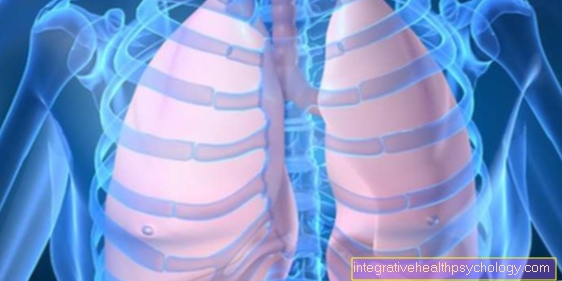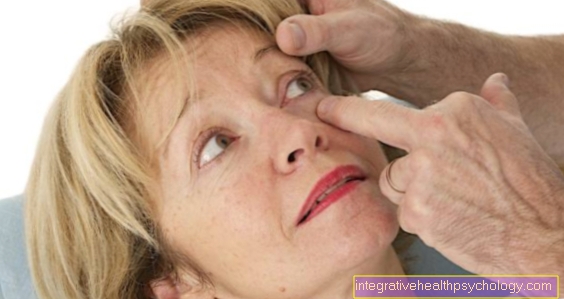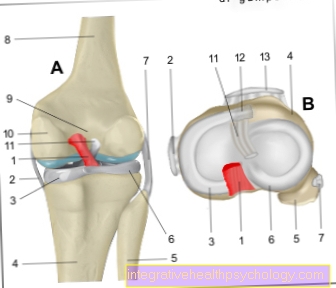dementia
Synonyms in a broader sense
- Alzheimer's disease
- dementia development
- Pick's disease
- Delirium
- forgetfulness
English: dementia

definition
Dementia is a general disorder Thinking functionsthat lead to impairment in everyday life. These disorders are common in many cases progressive and incurable (irreversible).
Epidemiology

Dementia is typically a disease of the elderly and the elderly (over 65 years of age). The likelihood of developing severe dementia before reaching the age of 65 is relatively low (less than 1: 1000). Beyond the age of 65, however, the probability increases to around 15% for mild dementia and around 6% for severe dementia.
Men get sick typically more often than women. The exception to this rule is the Alzheimer's disease to call, which typically rather Affects women.
causes
Overall, this question is difficult and inadequate to answer. Science knows dozens of causes that lead to one dementia being able to lead.
On the one hand there is the so-called. degrading (degenerative) dementias, where the causes are either genetically inherited or cannot be explained. Above all here are the Alzheimer's - dementia, of the Pick's disease (frontotemporal dementia), as well as the Parkinson's disease to call.
But there can be diseases and Blood vessel disorders lead to dementia. Often there are dementia changes Strokes (apoplexy), Reduced blood flow or oxygen deficiency.
Also Metabolic diseases how Diabetes mellitus, Porphyria or diseases of the thyroid can cause dementia if it goes bad.
Furthermore, you always have to Poisoning or substance abuse (e.g. drug addiction), infections and Cancer think when looking for the causes of dementia.
Dementia from alcohol
Alcohol consumption is definitely a risk factor for developing dementia. This has been observed again and again in many studies. Korsakoff syndrome can develop in patients who have been drinking significantly too much alcohol for years. This disease is characterized by massive memory disorders. In order to compensate for these gaps in memory, patients usually invent long-winded stories. This process is called "confabulating" in technical terms. Unfortunately, the disease cannot be cured even with adequate therapy. Dementia is irreversible.
Dementia after a stroke
Post-stroke dementia is also called vascular dementia. Here the circulatory disorders in the brain are the cause of the dementia. Due to the lack of blood circulation, nerve cells in the brain die, which leads to a disruption of cognitive function. After Alzheimer's, it is the most common cause of dementia. Unfortunately, vascular dementia is not curable. However, one should treat patients with risk factors early so that dementia does not develop in the first place. The risk factors for vascular dementia include diabetes mellitus, high blood pressure, cardiac arrhythmias, smoking, being overweight and high LDL or cholesterol levels.
Dementia after chemotherapy
Chemotherapy is unlikely to cause dementia. Nevertheless, there are always studies that indicate that brain cells are affected by chemotherapy. This fact is called "chemobrain" by scientists. Above all, it is about concentration disorders and reduced memory, even 10 years after chemotherapy. Not all scientists believe in this concept. Some also say that the psychological stress caused by cancer is enough on its own to change nerve cells in the brain. They see a kind of post-traumatic stress after cancer as the cause of the cognitive deficits.
What are the risk factors for dementia?
The risk of developing dementia increases sharply with age. The most common cause of dementia is Alzheimer's disease. The following additional risk factors were identified in large epidemiological studies:
-
female gender
-
Dementia in first-degree relatives
-
traumatic brain injury
-
underlying neurological disease, e.g. Parkinson's disease, Huntington's disease, stroke
-
Alcohol abuse
-
Risk factors for atherosclerosis: high blood pressure, smoking, diabetes, high cholesterol levels
-
Others: few mental challenges, social isolation, depression
Is Dementia Hereditary?
Unfortunately, there is no general answer to this question with “yes” or “no”. Basically, however, it can be said that most cases occur randomly and are not hereditary. The greatest risk factor is old age. Then it also depends on the cause of dementia. Vascular dementia is caused by circulatory disorders in the brain due to arteriosclerosis; there is rather no hereditary component here. Alzheimer's disease occurs randomly (sporadically) in 80% of cases.
However, there is also a familial Alzheimer's disease, which is inherited in an autosomal dominant manner and is characterized by an early onset of the disease (30-60 years of age).
Symptoms
In general, it can be said that the symptoms usually progress slowly. Such a development can often take years.
The following symptoms often develop at the onset of dementia:
- Mood disorders (depression, (hypo-) manic phases, etc.)
- Reduction of the drive
- Loss of interests and hobbies
- Rejection of anything new
- Increased forgetfulness with frequent misplacing of things
- Decrease in mental abilities
- Playing down the increasing intellectual weaknesses
One must of course bear in mind that the occasional occurrence of such symptoms can be quite normal and one cannot draw any direct conclusions about an impending dementia. For this reason, these symptoms must be described as uncharacteristic (atypical).
Typical symptoms, however, are:
- Loss of the ability to remember (especially new) things.
- Patients forget things that they knew before the onset of the disease or confuse and mix up individual information such as Birthdays (so-called time grid disruption)
- Patients gradually lose the so-called orientation towards the person, the time and the situation. This is because new information can no longer be stored and old information is forgotten.
- It is becoming increasingly difficult for patients to separate important information from unimportant information.
- Little by little, important decisions or transactions can hardly be carried out.
- In the course of the process, there is a change in the patient's basic personality. For example, people who were previously peaceful can suddenly become quick-tempered, or people who were previously contentious can become peaceful.There can also be reinforcements of certain personality structures.
Other common symptoms that may or may not appear include:
- Disorders in linguistic expression (e.g. difficulty finding words)
- Disturbances in the execution of manual tasks
- Disturbances in the knowledge and naming of actually known objects
- Increasing weight loss
Read more on the topic: Signs of dementia and Memory loss.
depression
Depression is a common symptom in dementia. It is easy to understand that the increasing loss of cognitive functions can trigger reactive depression in those affected. Patients notice that many things are no longer as successful as they used to be, which leads to insecurity, resignation and social isolation. It is therefore important to strengthen the patient's self-efficacy through suitable employment. In addition, drug therapy for depression also plays an important role. When choosing an antidepressant, it should be borne in mind that tricyclic antidepressants can often worsen the symptoms of dementia due to their anticholinergic effects. Therefore, one should rather refer to drugs of another class, e.g. Citalopram.
diagnosis
The diagnosis typically sets Psychiatrist (specialist in psychiatry), a neurologist (specialist in neurology), or a psychologist. The clinical symptoms are often very clear, so that the diagnosis can be made quickly and reliably. Often, however, there are indications of dementia that require further clarification.
Here comes the so-called "Test psychology"(E.g. clock test, mini mental state test) are used. For the most part, these are tests that very quickly give an idea of the type and extent of the disorder.
The diagnosis is rounded off by physical findings that can be collected (CT, MRT etc.)
Also read our article Recognize dementia.
Differential diagnoses
Age
When an organ such as If the brain is “in use” for a long time, there is a completely normal and natural decrease in performance. New things can no longer be learned so easily, old information is occasionally forgotten or mixed up. In contrast to "real" dementia, however, changes in mood, personality and other above-mentioned changes are usually missing. Features.
depression
A typical feature of depression is the so-called "concentration disorder". The severity of such a disorder can be very different. It can reach such an extent that psychiatrists (specialist in psychiatry) used to speak of “sham dementia” (pseudodementia). The best answer for separating dementia from depression can only be given by the course over time. Depression is curable, so symptoms (including difficulty concentrating) will regress as it improves.
More information at: Depression
States of confusion (delirium)
Various diseases can trigger states of confusion that lead to memory impairments.
This typically leads to a loss of orientation, incoherent thoughts and hallucinations. In contrast to the typical development of dementia, delirium arises very suddenly.
It is also usually quite treatable, so that the memory disorders can quickly improve again after the treatment. Typically this type of confusion occurs e.g. in the context of withdrawal syndromes in alcohol addiction.
Note: delirium
For the sake of completeness, it must be mentioned here that such delirious states can very often develop in the later course of dementia. At this point in time, however, the diagnosis of dementia in the patient has long been confirmed.
schizophrenia
Above all, poorly treated or poorly treatable courses of schizophrenia can also lead to a significant decrease in mental performance (residual symptoms). Typically, however, schizophrenia is accompanied by a variety of other symptoms.
Further information can be found under our topic: schizophrenia
simulation
Last but not least, one must also remember that there are people who could be “helped” to get the diagnosis of dementia and who therefore present symptoms that they must assume are typical of dementia. For the experienced diagnostician, this can usually be seen through very quickly. (How should of course not be revealed here ...)
Forms of dementia
The various forms of dementia can be distinguished from one another in different ways or divided into groups. Reference can be made to the localization of the changes in the brain, the cause of their development and the underlying disease.
If the degenerative processes occur in certain places in the brain, they are often followed by typical symptoms, which may not appear until later if they are located elsewhere. The supposedly specific symptoms, however, must not be taken as proof of the respective form of dementia. If there is any suspicion, further diagnostics must always be carried out in order to obtain clarity about the present clinical picture.
- Cortical dementia: In cortical dementia (cortex = Cortex) the cerebral cortex is affected by the pathological changes. The cerebral cortex (Cerebral cortex), which is located on the outside of the brain, is responsible for many functions. They control memory, motor skills, sensitivity and language, for example. Correspondingly, damage to the same presents itself in the form of impaired memory function, restricted ability to think and speak, as well as motor deficits. The personality, which is particularly controlled by the frontal lobes, is initially less influenced.
- Frontal dementia: Frontal dementia focuses on the frontal lobe, which is located on the front of the brain. He is responsible for the formation of the personality and for the planning of actions, as well as their consideration. The resulting deficits in the frontal lobe lead to major changes in the patient's character and an often negative change in social behavior. Planning or organizing thought processes can only take place slowly or not at all. The patient acts in an uncontrolled manner, whereby his intelligence is usually not restricted. Memory is also comparatively well preserved, as is the ability to orientate oneself spatially and temporally.
- Subcortical dementia: The subcortical dementia (sub = under, cortex = cortex) exists, as the name suggests, under the cerebral cortex, in the area of the basal ganglia. The basal ganglia are nerve nuclei that are used to process various types of information. The slower processing that occurs with subcortical dementia slows the patient's psychological pace. He acts and thinks more slowly, can concentrate poorly, or react to changed circumstances. Affective disorders complete the clinical picture, through increased irritation, but also listlessness and listlessness.
The distinction between primary and secondary dementia is made at the level of the cause of the disease. If there is primary dementia, this is due to direct changes in the brain. These can be degenerative (Alzheimer's disease) or vascular, i.e. vascular-related, for example. Secondary dementia, on the other hand, is caused by another underlying disease that primarily has nothing to do with the brain. Diseases of the cardiovascular system, poisoning, metabolic diseases and diseases of infectious, inflammatory or endocrine origin play a role.
Read more on the topic: Forms of dementia
Difference between dementia and Alzheimer's disease
Among laypeople, Alzheimer's disease is often used as a synonym for dementia or vice versa. This assumption is wrong. Dementia is not a disease in itself, but rather a combination of different symptoms - a syndrome. This syndrome is part of many brain diseases, which are then considered dementia, that is, cause dementia.
Alzheimer's is the most common of these dementias and is probably why it is so closely associated with the word "dementia". Around 60 percent of all dementia patients suffer from Alzheimer's disease, but other diseases can also be the cause. Alzheimer's is a neurodegenerative disease (deterioration of the nervous system) that gets worse as it progresses. So-called plaques (proteins) accumulate in the brain tissue, which cause the symptoms, including dementia.
Read more on the topic: Dementia vs. Alzheimer
Stages of dementia
Due to the different underlying diseases that can trigger dementia, different courses arise, which can be classified by stages. Often, however, the symptoms can be ascribed to a general stage that occurs across all diseases.
- Early stage: In the first stage, the patient becomes conspicuous primarily through a deterioration in short-term memory. Memories in the past can be called up without any problems, but there are problems with internalizing new information. Objects are often misplaced, new names mixed up or appointments forgotten. Orientation towards time is also waning - patients cannot give the exact date or day of the week. Thinking slows down and cognitive skills deteriorate. At this initial stage, the patient often notices the change and cannot explain it. The failures caused by dementia can lead to negative feelings. The patient appears anxious and resigned, withdraws from his environment or becomes aggressive. The aggressiveness is often directed against relatives who also notice the changes and want to help. The fear of suffering from a mental illness is great among old people - they do not want to be labeled "crazy". It is important to counteract this thinking through understanding.
- Middle stage: In the middle stage there is further loss of short-term memory, but also the first impairments of long-ago memories. The names of long-known people are mixed up and information is mixed up. New environments are problematic for many patients because of difficulty in orientation. This goes so far that dementia patients are no longer able to do things independently. There is an increased need for care. Concentration decreases and with it skills such as reading or arithmetic. Independent tasks are difficult or impossible to do because the complexity of thinking decreases. In addition, in contrast to the early stages, language problems arise. The sentence structure becomes simpler and conversations are often monotonous. Often sentences have to be repeated by the other person because it is difficult for the patient to follow the conversation. Mood swings can occur, which make it difficult to deal with other people. Due to an inner restlessness, demented patients often sleep poorly and are also active at night. This harbors various dangers: You are unsupervised and the risk of falling increases. The further the disease progresses, the worse self-sufficiency becomes. Hygiene measures are neglected and courses of action can no longer be implemented. Incontinence can occur even with moderate dementia.
- End stage: The end stage of dementia is accompanied by full nursing support. The patients are often bedridden or difficult to mobilize. Their motor and language skills are limited. People close to you, such as spouses or children, are also misunderstood, with your own name being the last thing to be lost in most cases. Orientation in terms of time or location is no longer possible. The patient perceives neither the surroundings nor himself. Normally, death is not caused by the dementia itself, but by accompanying diseases. These can arise from the patient's mostly old age or from his immobility. Bedridden patients in particular run the risk of succumbing to pneumonia.
Read more on the subject at: Stages of dementia
Signs

The mental faculties are first affected by the changes in the brain. Patients are overwhelmed with tasks and tire quickly. Complex questions or new problems can only be solved with difficulty and, as the degree of illness increases, not at all. The cognitive strategies required for this are missing. The memory is increasingly impaired, which affects performance in everyday life and social life. Things are increasingly misplaced and appointments are mixed up or forgotten. The patient's ability to learn increasingly deteriorates, which means that new information cannot be processed and retained well. The memory impairment negatively affects the temporal and spatial orientation. The date or day of the week can no longer be stated correctly. Comprehensive thought processes and logical conclusions are disturbed and thus also the ability to judge or accept criticism. The latter problem often also shows up on an emotional level. The patients become ill-tempered or fear the changes that they often fully experience. This can lead to various avoidance strategies in order to evade situations in which the patients run the risk of failure.
Read more on the topic: Dementia signs
Recognizing dementia as a layperson
The first signs of the onset of dementia can be insidious and therefore difficult to interpret. Since the patients can show fluctuating daily forms at the beginning, there is no chance for some general practitioners to express a corresponding suspicion. A diagnosis of dementia is often carried out by relatives, who in many cases are medical laypeople.
Even as a layperson, one can check whether there is a risk of dementia by paying attention to various abnormalities. Dementia patients are often tired in the early stages and their attention is limited. Complex tasks or puzzles can no longer be solved as well or only slowly. This can be checked particularly well if the person in question enjoys doing crossword puzzles or other brain teasers. If the relative suddenly refuses to do this, this can be a sign of increased failure in the past and the onset of dementia. Most sufferers notice the changes in the early stages and are ashamed of their inability. Furthermore, it can happen that they withdraw from their social life and avoid assistance. Furthermore, the memory is already limited when the illness begins. Patients often misplace their belongings, forget what their actual destination was on the way, or are wrong about the date or day of the week. These deficits can lead to a lack of orientation in terms of time and place, which puts additional strain on the patient's mind and can lead to further withdrawal.
Read more on the subject at: How do I recognize dementia?
Dementia test
As a standardized instrument for diagnosing cognitive deficits, including dementia changes, the MMST crystallized out - the mini mental status test. Be at this diverse abilities of the brain checked which one with rated on various points become. The higher the number of points achieved, the weaker the deficits. However, the test is only a “snapshot” of the patient's condition.
At a incipient dementia can the state fluctuate depending on the daywhich entails repeated testing. The questions relate to the Orientation and memory skills of the patient, but also on following simple instructions and that understanding reading and fine motor skills. The patient is questioned with increasing accuracy regarding the time (date, day of the week, month, year, season) and with decreasing accuracy regarding the local orientation (state, country, city, clinic / practice / nursing home, floor).
The Short term memory is tested using three words that the patient must remember for a few minutes. Will continue subtracted backwards, a series of prompts for Naming objects or actions posed and the Motor skills through a handwriting sample controlled. You are not allowed to help with any of the tasks, otherwise the result would be falsified.
There are many more neuropsychological tests, which are usually only used after a positive test result of the MMST. The test is positive if the score is below 25 out of a total of 30.
Watch test
With the watch test one tries to check the cognitive function of a test person. It is often used for the early detection of dementia. The test person is given a white sheet of paper with a circle, shows him where up and down is, and asks him to fill in the missing digits and to draw a specific time. This can then be evaluated using certain criteria. In the initial stage, there are only slight visual-spatial errors, e.g. the numbers are not evenly spaced, individual numbers are slightly outside the circle. With increasing cognitive impairment, digits are sometimes forgotten, more circles are drawn, the digits are barely legible and are somewhere on the sheet. In the early stages in particular, those affected compensate for their cognitive deficits very well, which is why the watch test is a useful method to uncover any deficits.
Prognosis and course
There dementia represents a syndrome - being yourself different symptoms Put them together to form an overall picture - is their course depending on the underlying diseaseon which it is based. Both the total duration of the disease process and the Speed can vary from disease to disease.
The most common dementia disease - Alzheimer's disease - can only last a few years or decades. The course is usually limited by an accompanying illness, which is ultimately responsible for the death of the patient. The course of the dementia syndrome can generally be divided into stages, which have common features across all diseases.
- in the Early stage it often happens first Deficits in memory, to Difficulty concentrating, to a Withdrawal from the social environment, to Disorientation and helplessness such as Fear and anger against yourself.
- A moderate dementia is characterized by the further loss of memory, by simplified thinking, Loss of independence with an increasing need for nursing support, General deterioration and through psychomotor symptoms how Delusions, paranoia, and anxiety.
- in the Terminal stage does the patient have the most of his cognitive skills lost, can no longer cope with the simplest tasks and can no longer internalize or retrieve information. The memory gradually becomes limited to one small circle of memories and the patient loses his mobility, becomes bedridden - one full-time care is needed and the sick person is no longer aware of anything.
How long the stages last and how quickly the deterioration occurs is disease-specific. Of the The course can be bursty or continuous. In Alzheimer's dementia, there is one permanent progression of cognitive losses.
In contrast to this is the vascular dementiawhich its cause in the disease of the vascular system and the following Undersupply of the brain Has. In the vascular dementia there is an intermittent worsening of the symptoms. The patient steps in again and again Phases of stagnation, which often falsely gives rise to hope of a cure. But both vascular dementia, and Alzheimer's dementia are primary dementias.
Basically, the course depends on the cause of the disorder. As mentioned above, a e.g. dementia caused by alcohol poisoning will disappear completely.
In most cases (approx. 80-90%), however, only the symptoms can be treated and no longer the cause of the disorder. One can therefore say that dementia is usually not curable, but in the best case it can be slowed down.
For more information on this topic, see Dementia History.
What is the life expectancy with dementia?
There is no general answer to this question. It depends on many factors. On the one hand, this is the form of dementia. On the other hand, it is important at what age the patient suffers from dementia. Furthermore the fact decides how fast the disease progresses in the patient. Of course, it also plays a role whether there are other diseases. In addition, it is usually not the dementia that leads to death, but the accompanying circumstances.
The patients have a higher risk of various comorbidities. Swallowing disorders can lead to life-threatening pneumonia (aspiration pneumonia) when food is swallowed. The patients are also often underweight and do not drink enough. This can also have health consequences for the patient. Ultimately, it is not possible to give a binding figure for how long the life expectancy in dementia is.
What does the terminal stage of dementia look like?
Ultimately, most forms of dementia are a progressive disease that leads to the increasing loss of nerve cells in the brain. In the end-stage or advanced dementia, the patient has lost all cognitive abilities. The person affected can no longer memorize new things, and old content in the memory can no longer be accessed. You forget your own name, birthday, the fact that you may be married and / or have children, ultimately your entire biography. The affected person also completely loses their temporal and spatial orientation. The day-night rhythm is also often disturbed. Most of the end-stage dementia sufferers speak little. Mental decline is followed by a physical process of degradation. Due to a swallowing disorder, normal food intake no longer works properly. The patients lose weight. In addition, there is usually incontinence. The drive is so reduced that the patients are often bedridden. The risk of pneumonia and life-threatening infections increases.
Care level for dementia
Dementia patients will be using As the disease progresses, more and more in need of care. For the support of the patient as well as the relatives, the Care funds one care level be requested. The Degree of care by employees of the local medical service determined and then evaluated in a tier system. Care levels 1-3 can be achieved. Many dementia patients, when they are at the beginning of their illness, can still look after themselves largely independently, but still need regular help with certain activities. The displeasure of many relatives about not reaching the first level of care has led to a Care level 0 was introduced. The time required for care can be less than 90 minutes a day, which is a requirement of care level 1. "Limited everyday skills" are sufficient to achieve care level 0 and thus to receive approved financial support.
If it is suspected that the currently approved level of care is no longer sufficient to meet the patient's needs, a re-examination be sought. In the Care level 2 must be at least 3 hours and at the Care level 3 At least 5 hours a day are spent caring for the patient. A The effort involved in basic care plays an important rolewhich includes physical hygiene, dressing, going to the toilet and eating. With the financial support given to the patient or their relatives, either a nurse can be employed or internal family care can be facilitated.
For more information, see: Care levels in dementia
therapy
The often unfavorable prognosis of dementia already shows that by and large there are only very unsatisfactory therapeutic approaches in the treatment of dementia.
First of all, it must be stated that there is no drug that can treat the cause of dementia or even cure it.
The doctor must therefore pay particular attention to whether the present dementia development is one of the more treatable types (e.g. depression, etc.). Overall, the therapeutic approach is very complex.
Particularly in the early stages of dementia, herbal preparations can improve the symptoms. Ginkgo preparations in particular are suitable for improving brain performance. Although the effect of ginkgo has been scientifically proven, the mechanism of action of ginkgo has not yet been unequivocally clarified.
For more information, see our topic: Ginkgo
Drugs can improve the symptoms of dementia in a much more potent way.
There are various drug approaches that have shown that dementia development slows down overall (so-called antidementia drugs).
Typical drugs here are:
- Memantine (e.g. Akatinol Memantine ®),
- Piracetam (e.g. Nootrop ®)
- Rivastigmine (e.g. Exelon ®)
- Galantamine (e.g. Reminyl ®)
In addition, numerous other drugs are used, depending on the accompanying symptoms.
In the event of additional hallucinations, ideally low-dose neuroleptics (e.g. Risperdal ®) should be used.
With additional depressive symptoms, one relies on antidepressants. On the therapeutic side, it must be ensured that some antidepressants can intensify the symptoms of dementia. For this reason, the so-called SSRI or SSNRI in particular should be used.
Benzodiazepines (e.g. Valium) may be helpful in chronic restlessness. It should be noted, however, that all benzodiazepines can produce a so-called paradoxical effect. This is a reversal of the desired effect. The medication does not have a dampening effect, but stimulates it. In addition, benzodiazepines are addictive with regular use.
Weak neuroleptics (e.g. Atosil, or Dipiperon) are more suitable for treating states of restlessness.
In addition to the medicinal approach, it is important to regularly promote and challenge the existing mental abilities. Especially at the beginning of dementia, regular training can lead to a positive, slowing course of development.
With a progressive decline in mental performance, the need for care of the patient and the demands on relatives increase.
Read more on the subject at: Drugs for dementia
Will dementia become curable?
Whether dementia can be cured depends on how you understand the question. Will it be possible to cure existing dementia? At the moment, this question can be answered relatively safely with no. Can you prevent dementia from progressing? Or. can you stop the process in the early stages? In this case, the question is not that easy to answer. There are numerous forms of dementia. Depending on the cause of the dementia, appropriate treatment options must be found. Intensive research is being carried out on Alzheimer's dementia.
What are good things to do for people with dementia?
Everyone has a natural need for employment, this also applies to people with dementia. Activity protects against loneliness. In addition, existing skills can be trained. This strengthens the patient's self-confidence. It is important, however, not to overwhelm the sick person with the job. Therefore, it should be decided as individually as possible how to deal with the dementia patient. In any case, it makes sense to consider the stage of dementia.
With dementia in the early stages, memory training can still be fun, but if the dementia progresses, those affected often become insecure very quickly. It should also play a role what the patient used to enjoy doing. For example, not every patient likes to do handicrafts. In principle, hobbies such as painting, handicrafts or light manual work, including gardening, are well suited to employing people with dementia. This also applies to cooking or baking together. However, one must be very careful that the patients do not injure themselves on kitchen utensils. Exercise is also beneficial for the patient. Regularly accompanied walks are possible. In addition, familiar music is a good form of employment; this applies to both listening to music and singing together. It is simply important to address the patient and his needs individually.
Prevent dementia
Dementia and the mental decline in old age can be prevented to a certain extent. The demands on the brain decrease with advancing age. The job is usually no longer practiced and everyday life is routine. The strength and desire is lost to break out of the daily grind, which puts less strain on the brain. It degrades in its capabilities since it is no longer needed in its entirety. This degradation can be counteracted with brain teasers such as crossword puzzles, Sudoku and other exercises in logical thinking. They get the brain to maintain its function and also promote mental fitness. Reading the newspaper or keeping a journal can also have a positive effect on thinking.
In addition to the active exercises, the body should also be given enough rest. Healthy sleep habits promote mental and physical health. On average, 7 hours of sleep per night should be achieved in order to allow the brain to process the impressions of the day and to let the body recharge its batteries. Both too little and too much sleep can promote the development of dementia. A healthy lifestyle is the prerequisite for holistic health. Physical activity and a healthy diet with enough fruit, vegetables, fish and whole grain products keep the vascular system in good condition. Among other things, a vascular disease can lead to a restricted supply of the brain and thereby cause damage. The development of dementia is thus promoted.
Read more on the subject at: How can you prevent dementia?

